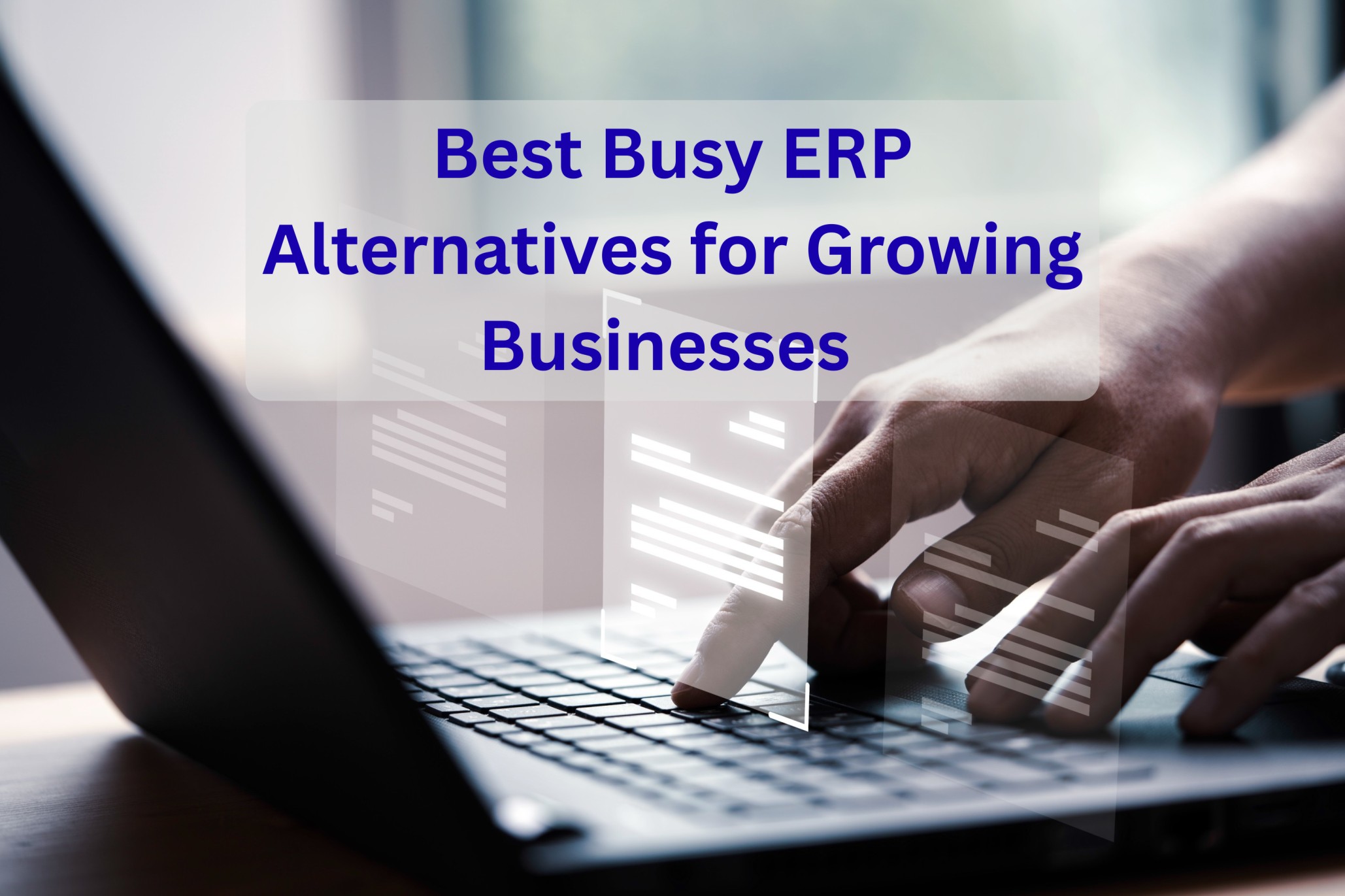- TL;DR — Best ERP System in 2025 (Sri Lanka Buyer’s Guide)
- How to Select the Best ERP System in 2026: A Complete Buyer’s Guide
- What is an ERP System?
- How Does ERP Help Sri Lankan Businesses?
- Key ERP Challenges for Sri Lankan Businesses
- Top Factors to Consider When Choosing an ERP System in Sri Lanka
- Top ERP Products in Sri Lanka – 2026 Comparison
- Blue Lotus 360 ERP
- SAP Business One
- Odoo
- Microsoft Dynamics 365
- Acumatica
- Sage 300 and Sage X3
- How Blue Lotus 360 Stands Out in 2026?
- Conclusion
TL;DR — Best ERP System in 2025 (Sri Lanka Buyer’s Guide)
Sri Lankan businesses in 2025 need cloud-based, scalable, and localized ERP systems to stay competitive.
What to Look For:
– Industry fit – Choose ERP built for your sector.
– Cloud-first – Lower costs, real-time access, remote work ready.
– Localization – Supports Sri Lankan taxes, Sinhala/Tamil, and compliance.
– Integration – Works with accounting, eCommerce, and payroll tools.
– Scalability & ease of use – Grows with your business, mobile-friendly UI.
Top ERPs 2025:
Blue Lotus 360 – Fully localized, cloud-native, mobile, strong local support.
SAP B1 – Global powerhouse, costly and complex.
Odoo – Affordable, modular, great for SMEs.
Dynamics 365 – Enterprise-grade, Microsoft-integrated.
Acumatica – Cloud-native, real-time insights.
Best Pick:
Blue Lotus 360 ERP – Built for Sri Lanka, fast to deploy, secure, and future-ready.
How to Select the Best ERP System in 2026: A Complete Buyer’s Guide
Businesses in Sri Lanka are adopting technology to stay ahead of the times. An ERP is often portrayed as a sword by businesses. ERP stands for Enterprise Resource Planning, and it lets companies organize finances, inventory, payroll, human resources, etc., under one umbrella.
Businesses in Sri Lanka, both large and small, are beginning to recognize the demand for implementing state-of-the-art ERP solutions to help optimize performance while maintaining a competitive edge. The question is, which ERP is the best for your business in Sri Lanka?
We intend to help you understand what an ERP system is, the unique challenges businesses in Sri Lanka must overcome, and what to look for in a best ERP system in 2026.
What is an ERP System?
An ERP system is essentially an application that integrates all the major functions of a business into a single software. One of the reasons an ERP is so powerful is that it can consolidate different systems for accounting, HR, inventory, project management, and warehouse management in one place. That makes it simple for you to run your business, increase accuracy, and save time.
Here are the key modules of a standard ERP system Sri Lanka:
- Finance: Manage the team’s finances, including accounting, budgets, and financial reporting.
- Logistics: Oversee warehousing and stock ordering.
- HR (Human Resources): Provide employee records, payroll, and performance management.
- Production: It monitors manufacturing workflows, work orders, and quality of the product.
- Inventory Management: The tool helps you efficiently track, manage, and optimize your inventory levels and stock movements.
How Does ERP Help Sri Lankan Businesses?
- Increasing productivity: Automated methods can prevent human error, which can be a significant time saver.
- Supporting scale: As you grow, ERP can accommodate additional data and users.
- Higher visibility: Reduce time to control offers with real-time dashboards and reports.
- Regulatory compliance: A cloud-based ERP tailored for Sri Lanka can efficiently manage local tax rules, labor laws, and other regulations. With automatic updates and secure cloud infrastructure, your business stays compliant with evolving legal requirements—without the complexity of maintaining on-premise systems
Key ERP Challenges for Sri Lankan Businesses
So, ERP has advantages, but for businesses in Sri Lanka, it presents its challenges in implementing and effectively using these systems.
- Requirements for Personalization and Localization
Each nation has its own rules for conducting business. In Sri Lanka, companies must have ERP systems that can cope with local tax codes (VAT, NBT), accounting standards, and reporting formats. The out-of-the-box global ERP systems, in contrast, often demand heavy modification in order to fit the bill.
- Factors of Language, Tax, and Compliance
It is necessary to have Sinhala and Tamil language support in ERP software in Sri Lanka. Sri Lanka’s Inland Revenue regulations, as well as employment and other local laws, must also be adhered to. Opting for an ERP system that provides local support and compliance downloads may save your company headaches later on.
- Connectivity and Infrastructure Concerns
While internet speeds in Sri Lanka are improving, there may be areas with slow or unreliable internet. With our cloud-based ERP, you can access your business operations anytime, anywhere, from any device. There’s no need to worry about location or connectivity limitations—our platform is designed for seamless, real-time access and productivity whether you’re in the office or on the move
Top Factors to Consider When Choosing an ERP System in Sri Lanka
To choose the ideal ERP system for your company in Sri Lanka in 2026, consider the following factors:
- Industry-Specific Needs
Each sector has its own set of needs in ERP. For example:
- Many manufacturing companies require modules for production planning, shop floor control, and quality management.
- Plantation and agriculture businesses may require tools for estate management, crop production, and export documentation.
- The distribution players are centered on inventory, logistics, and order execution.
Ensure that the ERP software can meet your unique industry needs when considering ERP solutions.
- Cloud vs. On-Premise Deployment
AS the clock ticks to 2026, lots of Sri Lankan businesses are migrating to cloud ERP, as:
- Minimal upfront costs – You don’t have to buy expensive hardware.
- Telecommuting – Work from anywhere with an internet connection.
- Auto updates – Stay current with the latest functionality and compliance requirements, without the need for large investments in hardware or IT infrastructure. With cloud ERP, updates are automatic and seamless, ensuring you always have access to new features and security enhancements while reducing operational costs and eliminating the burden of maintaining physical servers and equipment
Cloud-based ERP is the ideal choice for modern businesses seeking flexibility, scalability, and cost efficiency. With our solution, you benefit from secure access anytime, anywhere, automatic updates, and reduced IT overhead—making it the smart option for companies looking to stay competitive and agile in today’s fast-paced environment.
- IT Teams and Infrastructure You Can Count On.
- Rigorous data protection rules.
- Poor or no internet access.
Assess your company’s own IT capabilities and connectivity before making a selection.
- Integration Capabilities
Your ERP system should integrate smoothly with the software you use, including:
- Accounting software (e.g. QuickBooks, Xero)
- E-commerce platforms
- Payroll systems
- Custom applications
An ideal ERP solution for Sri Lanka should offer integration features to ensure seamless data exchange across systems.
- Scalability and Support
Select a scalable ERP solution to invest in that and can build along with your organization. Regardless of whether you’re growing regionally or expanding your product offerings, your ERP service should be able to process additional users, transactions, and data without underperforming.
You should also see if the supplier has:
- 24/7 local support in Sri Lanka.
- Regular updates and maintenance.
- Training resources to help your team adapt quickly.
- Cost of Ownership (Immediate: Long Term)
The number-one ERP system in 2026 isn’t necessarily about the price. Look at:
- One-time costs – Licenses, hardware (if on-premise), installation fees.
- Recurring costs – Subscription, maintenance, support, and upgrades.
- Clarifications and hidden price –Customization, training, and add-on modules.
Conduct a total cost of ownership (TCO) study to see what the long-term expense is.
User Experience and Training
Your team will get frustrated by a complex ERP system. Choose software that is:
- Very easy to use with a friendly human interface.
- User-friendly with online help and tutorials.
- Customizable to your workflows.
Products that offer hands-on training and ongoing support are worth considering.
Top ERP Products in Sri Lanka – 2026 Comparison
Enterprise Resource Planning (ERP) systems are essential for businesses in Sri Lanka striving to streamline operations, manage resources efficiently, and embrace digital transformation. With 2026 marking a year of rapid technological advancements and digital adoption, Sri Lankan businesses must choose an ERP solution that fits their unique needs.
Here’s an in-depth comparison of the leading ERP products in Sri Lanka for 2026, focusing on their key features, strengths, challenges, and best-fit industries.
Overview Table – ERP software Comparison SL (2026)
| Vendor | Key Features | Pros | Cons | Ideal For |
| Blue Lotus 360 ERP | Advanced cloud | Fully localized and global reach | Not at all | All types of businesses |
| SAP Business One | SAP HANA integration, on-premise/cloud options | Global brand, robust reporting, reliable infrastructure | High cost, complex implementation, and needs skilled IT | Large enterprises, subsidiaries |
| Odoo | Highly modular, customizable, clean dashboard, cost-effective | Flexible, affordable, vast module library | Requires expert customization, some modules lack depth | SMEs across industries, especially cost-conscious ones |
| Microsoft Dynamics 365 | Cloud-first ERP, seamless Office 365 integration, AI-driven insights | Scalable, modern UI, strong support | Expensive, complex deployment | Large businesses, especially with the Microsoft stack |
| Acumatica | Cloud-native, real-time data, flexible licensing, low-code customization | Highly scalable, mobile-friendly, strong compliance | Complex customization may require expertise | SMEs to mid-size businesses, multiple sectors |
| Sage 300/Sage X3 | Sage 300 for SMBs (accounting, projects), Sage X3 for large enterprises (multi-language, multi-currency) | Strong financial management, easy to use, customizable reporting | Sage 300 is limited for large enterprises, higher cost for X3 | SMBs (Sage 300), Large enterprises (Sage X3) |
Blue Lotus 360 ERP 
Blue Lotus 360 ERP is a specialized solution designed for Sri Lankan businesses that caters to the unique operational and regulatory challenges they face. It is designed to empower businesses across diverse industries—including manufacturing, construction, services, agriculture, trading and distribution, public and non-profit sectors, retail, and more—helping them grow while becoming more agile, efficient, and adaptable.
Key Features:
- Completely localized to the Sri Lankan businesses, tax, and regulation.
- All the cloud-first architecture, mobile-friendly interface.
- Dedicated plantations, non-profits, or distribution modules.
- Sophisticated reporting, BI tools, and data visualization.
- Sireno is used in conjunction with existing tools with a minimal learning curve and can be deployed quickly.
Pros:
- Customized for Sri Lankan industry and business practices.
- Great intuitive and simple User Interface (UI) (including mobile app).
- Full functionality across HR, finance, inventory, sales, and more.
- Quality After Sales Services and local consultancy.
Cons:
- Not have any
SAP Business One
SAP Business One is an internationally recognized ERP that delivers flexible, real-time business insights, powerful reporting, and first-class integration within the SAP solution. It has the flexibility with both on-premises and cloud deployment so it a good fit for large enterprises in Sri Lanka.
Key Features:
- Immediate feedback and data analytics.
- Sophisticated financial management and operational controls.
- Easily scalable to accommodate larger, more comprehensive operations and multiple locations.
Pros:
- World-class record of dependability and innovation.
- Optional cloud or on-premise deployment.
- Awesome reporting and analytics.
Cons:
- High TCO (Total Cost of Ownership).
- Hardware, whether it is easy to implement or not, Isis Small Business is easy to deploy.
- Not always fully customised to ensure Sri Lankan compliance.
Odoo
Odoo is popular for its cost-effectiveness, flexibility, and modular structure, reason why SMEs in Sri Lanka prefer it. Due to the open-source nature of Odoo and its extensive module library, companies can tailor the ERP functionalities according to their requirements.
Key Features:
- Modular system with CRM, accounting, HR, inventory, and more.
- Noob friendly minimal dash and easy to customize.
- Third-party tools and plugins support.
- There are community (free) and enterprise (paid) editions.
Pros:
- Cost-effective and scalable.
- Very flexible and can be customized.
- Clean interface and workflow are just so intuitive.
Cons:
- Specialized developers are needed in the customization process.
- The ease of use is not what it was, and some modules are less mature than the top products.
Microsoft Dynamics 365
Simple and Modern Office Productivity Suite. From the office to the field, Microsoft Dynamics 365 is a cost-effective, familiar, and smartly scalable, cloud-based solution to cover all your business management needs.
Microsoft Dynamics 365 Microsoft Dynamics boasts a full ERP and CRM suite for enterprise and mid-market companies, with full integration to all things Microsoft: Office 365, Power BI, and Azure.
Key Features:
- AI-based intelligence and stylish UI.
- Cloud-first delivery with low-code/no-code configuration.
- One feature that stands in the way of departmental collaboration.
- Scalable licensing to suit your business growth.
Pros:
- Microsoft tools are heavily integrated.
- Slick, user-friendly interface.
- Very scalable with good compliance assistance.
Cons:
- Considering the license and the fee for the implementation are expensive.
- Advanced configuration can be on the heavy side for IT.
Acumatica
Acumatica offers a cloud-native ERP with a focus on real-time data access, scalability, and low-code customization. Its flexible licensing and device-agnostic design make it appealing for businesses seeking modern ERP capabilities.
Key Features:
- Real-time business insights from a single data source.
- Seamless cross-module workflows and automation.
- Mobile access from any device.
- Easy integration with existing tools and third-party systems.
- Compliance with global standards like GDPR, SOC, and PCI DSS.
Pros:
- Highly scalable and modern architecture.
- Excellent mobile support and user-friendly UI.
- Strong compliance features.
Cons:
- Customization may require technical expertise.
- It may be seen as complex for smaller businesses.
Sage 300 and Sage X3
Sage 300 is designed for small to mid-sized businesses, offering essential financial, inventory, and project management capabilities. Sage X3 targets larger enterprises with complex global operations and multi-currency, multi-legislation support.
Key Features:
- Sage 300: Robust accounting, project management, customizable reporting.
- Sage X3: Advanced features for global operations, multi-language, multi-currency.
- Optional integration with Microsoft 365.
- Deployment flexibility (on-premise or cloud).
Pros:
- Strong financial management features.
- Scalable and customizable.
- Well-supported ecosystem.
Cons:
- Sage 300 may be too limited for growing enterprises.
- Sage X3 has a higher cost of ownership and complexity.
How Blue Lotus 360 Stands Out in 2026?
As businesses in Sri Lanka navigate the digital transformation wave of 2026, Blue Lotus 360 ERP stands out as a comprehensive, agile solution that goes beyond traditional ERP offerings. Blue Lotus 360 is specifically designed to meet the requirements of Sri Lankan enterprises.
- Strategic Local Integration
What makes Blue Lotus 360 exceptional is its intrinsic alignment with Sri Lanka’s regulatory frameworks and operational culture. Unlike global ERP providers that often retrofit features for compliance, Blue Lotus 360 integrates local tax regulations, legal requirements, and reporting standards into the core architecture. This ensures a smoother, faster deployment with fewer adjustments.
- Real-Time Decision Empowerment
In a fast-paced business environment, the ability to access insights instantly is a competitive advantage. Blue Lotus 360’s built-in analytics and real-time dashboards empower decision-makers with actionable intelligence. Whether you’re managing complex supply chains or overseeing multi-location operations, the ERP’s adaptive reporting tools offer clarity and foresight. It enables proactive responses rather than reactive fixes.
- Designed for Mobility and Modern Workstyles
Recognizing the shift toward mobile workforces and remote operations, Blue Lotus 360’s mobile-first design philosophy ensures that critical business functions are accessible on the go. With a consistent user experience across devices, employees can monitor performance, approve transactions, and collaborate effectively from anywhere, be it a corporate office in Colombo or a field operation in the Central Highlands.
- Rapid Deployment with Expert Support
One of the standout strengths of Blue Lotus 360 is its agile implementation methodology, supported by local experts who understand Sri Lanka’s unique business landscape. Instead of a “one-size-fits-all” approach, deployment strategies are tailored to each client’s industry, size, and operational complexity, ensuring minimal disruption and faster time to value. Coupled with comprehensive onboarding programs, organizations can get up and running swiftly without compromising operational continuity.
- Proven Success Across Key Sectors
Blue Lotus 360’s credibility isn’t just theoretical—it’s backed by real-world implementations that demonstrate its versatility and impact. From optimizing procurement processes in plantation estates to enhancing financial transparency for non-profits and streamlining production in manufacturing plants, the ERP has delivered measurable results. Its adaptable modules cater to the nuanced demands of different industries, making it a trusted partner for organizations looking to scale efficiently.
- Scalability for the Future
As businesses grow, their systems must evolve to handle increasing complexity. Blue Lotus 360 is designed with scalability at its core, offering modular expansion capabilities, seamless integration with third-party applications, and flexible cloud deployment options. This ensures that Sri Lankan enterprises can expand confidently without facing technical bottlenecks or costly overhauls.
Questions to Ask ERP Products Before Buying
- What’s the typical implementation timeline?
- Are there hidden costs (customization, support, upgrades)?
- How often is the system upgraded or patched?
- Do you have case studies or references from Sri Lankan businesses?
- How secure is the system, and what compliance standards does it meet?
- What integrations are available with other business systems?
- What is the post-implementation support plan?
ERP Implementation Best Practices
- Align internal stakeholders early to ensure smooth change management.
- Develop a clear training and onboarding plan to maximize adoption.
- Prepare data for migration and clean existing records.
- Work closely with the vendor’s support team for troubleshooting and optimization.
Conclusion
Selecting the best ERP 2026 is crucial for businesses seeking to remain competitive and adopt digital transformation. With options like Blue Lotus 360 ERP, SAP Business One, Odoo, Dynamics 365, Acumatica, and Sage, each offers unique strengths and challenges.
Blue Lotus 360 ERP shines with its local expertise, advanced modules, and seamless support, making it a top contender for Sri Lankan enterprises of all sizes.















